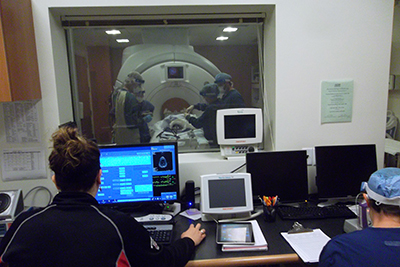Wisconsin National Primate Research Center
Grant Number: P51OD011106
Research Emphasis/Objectives
The Wisconsin National Primate Research Center's (WNPRC) mission is to increase our understanding of basic primate biology and to improve human health and quality of life through research. To accomplish this, the WNPRC—
- Helps discover treatments, preventions, and cures for human disease.
- Generates new knowledge of primate biology, from the molecular and whole-animal levels to the understanding of primate ecosystems.
- Facilitates research progress by providing expertise, resources, and training to scientists worldwide.
- Collects primate information and disseminates it to the research community and the public.
Quick Facts
- Personnel: The WNPRC employs 190 research, administrative, and student employees who support research by more than 258 scientists from the University of Wisconsin–Madison (UW–Madison), the United States, and around the world. The WNPRC supports 191 UW–Madison postdoctoral, graduate, undergraduate, veterinary, and other trainees, of which 22 are also employees.
- Funding: The WNPRC is supported by a $9.65 million NIH base operating grant to the WNPRC and UW–Madison. Scientists annually work on more than 200 research subprojects supported in part or in full at the WNPRC by other federal and nonfederal research grants.
- Colony: The WNPRC's 1,586 animals comprise 1,120 rhesus macaques, 221 common marmosets, and 245 cynomolgus macaques.
- Samples: The WNPRC distributes more than 55,400 research samples each year to scientists worldwide.
Current Research
The WNPRC focuses on four strategic areas of research and a diverse affiliate program:
Global Infectious Disease (GID): Transmission and pathogenesis of simian immunodeficiency virus (SIV), Zika, dengue, influenza, viral escape, vaccine development, major histocompatibility complex (MHC)-defined animals, identification of new viruses with zoonotic and/or pandemic potential.
Regenerative and Reproductive Medicine (RRM): Pluripotent stem cell biology, including cellular therapies for hematologic, cardiovascular, and neurodegenerative diseases; organ transplant tolerance; stem cell–based therapies for AIDS. Assisted reproductive technologies (ART) for nonhuman primate transgenesis; maternal–fetal health, including pregnancy loss and poor outcomes; intrauterine environment in metabolic and reproductive epigenetic programming; endometriosis; polycystic ovary disease.
Energy Metabolism and Chronic Disease (EMCD): Chronic disease and aging research, with an emphasis on the genetic, cellular, and whole-animal effects of calorie restriction (CR), as well as excess caloric intake resulting in obesity and metabolic syndrome. Diabetes mellitus, osteoporosis, new studies on post-menopausal hormone changes and metabolic disease risks.
Neuroscience: Preclinical Parkinson’s disease research, translational studies of glaucoma, cognition, attention, visual perception, sensorimotor integration. Stress, anxiety, and depression. Basic studies of central nervous system mechanisms controlling fertility, puberty, menopause, and body weight. Neuroendocrine regulation of reproductive and social behaviors.
Services Provided
To Affiliate Scientists/Outside Investigators
Researchers interested in conducting research through the WNPRC and using any of the below services or resources should first contact the Scientific Protocol Implementation (SPI) Service, which integrates the expertise of Research Services and Resources and Animal Services to help researchers conduct leading-edge science supported by expert animal care.
Research Services and Resources
- Assay Services
- Genetics Services (host genotyping, viral pathogen sequencing)
- Immunology Services
- Virology Services
- Informatics and Data Services
- Stem Cell Resource
- Precision Medicine Resource
Animal Services
- Scientific Protocol Implementation
- Behavioral Services
- Colony Management
- Compliance and Training
- Pathology Services and Tissue Distribution
- Veterinary Services
To Collaborating Scientists
The WNPRC actively encourages national and international researchers to use its facilities and services and to conduct collaborative studies. Scientists wishing to conduct research must have their projects reviewed and approved by the WNPRC director and advisory committees and have independent funding to cover costs. Most of the WNPRC's services are available on a fee-for-service basis.
Contact Information
Wisconsin National Primate Research Center
1220 Capitol Court
Madison, WI 53715
primate.wisc.edu
Principal Investigator
Cynthia Czajkowski, Ph.D.
Interim Vice Chancellor for Research
University of Wisconsin–Madison
Contacts
Jon E. Levine, Ph.D.
Director
Phone: 608-263-3500
[email protected]
Jordana Lenon, B.S., B.A.
Public Information and Outreach
Phone: 608-263-7024
[email protected]



